Senate
Latest
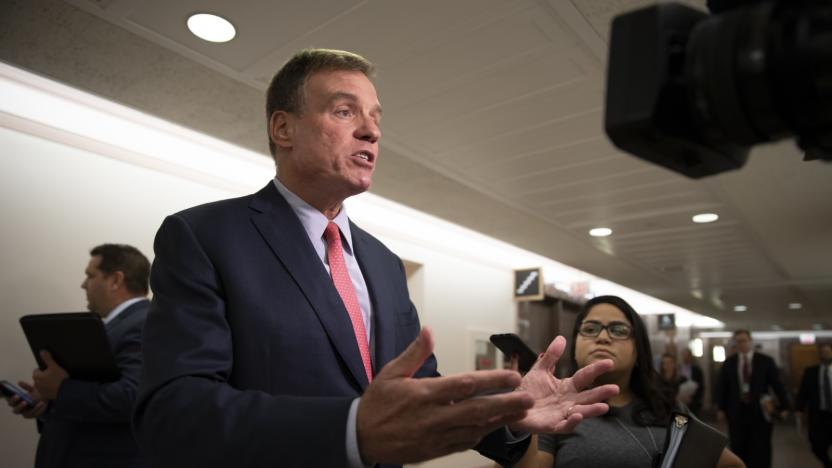
Senate bill would make companies put a price on personal data
Many will tell you that internet giants see your data as their most valuable resource, but politicians now want to put a number on that value. Senators Mark Warner and Josh Hawley are introducing the Designing Accounting Safeguards to Help Broaden Oversight and Regulations on Data Act (conveniently DASHBOARD Act for short), a bill that requires companies with 100 million or more monthly users to not only disclose the type of data they collect, but to put a monetary value on that data every 90 days. If Facebook and Google think you're worth $5 per month, they would have to say as much. The Securities and Exchange Commission would have to develop methods for calculating that value.

Senate panel schedules a hearing on Facebook's cryptocurrency
It didn't even take 48 hours after Facebook announced its cryptocurrency scheme for the government to raise an eyebrow. House Financial Services Committee Chairwoman Maxine Waters called for Facebook to halt development, and now the Senate Committee on Banking, Housing and Urban Affairs has scheduled a hearing to cover both Libra/Calibra and privacy issues. The committee did not list the names of witnesses it plans to call, but Reuters reports that Facebook's blockchain exec David Marcus is expected to testify. Will it be a worthwhile exercise that reveals more information about the plan and digs up useful information about how Facebook will manage the information generated or will it be another embarassing episode of political grandstanding? We'll find out on July 16th at 10 AM ET.

After Math: What's the holdup?
This week's theme is waiting. Sonic the Hedgehog fans will have to do three months of it after complaining about Sonic's oddly human teeth, while Julian Assange won't have to do any more to know what charges the Feds are leveling at him. Let's get started already.

Anti-robocall bill passes almost unanimously in the Senate
Senators have overwhelmingly backed a bill to combat robocalls. They voted 97-1 to pass the Telephone Robocall Abuse Criminal Enforcement and Deterrence Act, which would empower law enforcement to tackle robocallers, and bump up civil penalties to as much as $10,000 per call.

Senators reintroduce bill to improve AI adoption in government
US senators aren't giving up on their dream of promoting AI use in government. A bipartisan group including Cory Gardner, Kamala Harris, Rob Portman and Brian Schatz has reintroduced the AI in Government Act in a bid to foster the adoption of AI in the federal government. As before, it would task government branches with exploring and implementing the use of the technology where possible.

Senate bill would ban paid loot boxes in games aimed at kids
Efforts to crack down on loot boxes in the US might be underway in earnest. Senator Josh Hawley has introduced a bill, the Protecting Children from Abusive Games Act, that would bar games from including paid loot boxes, pay-to-win mechanics and other potentially exploitative elements in games that are either aimed at kids under 18 or knowingly let those children make microtransactions. These practices spur "compulsive habits," Hawley said, and developers shouldn't be permitted to "monetize addiction."
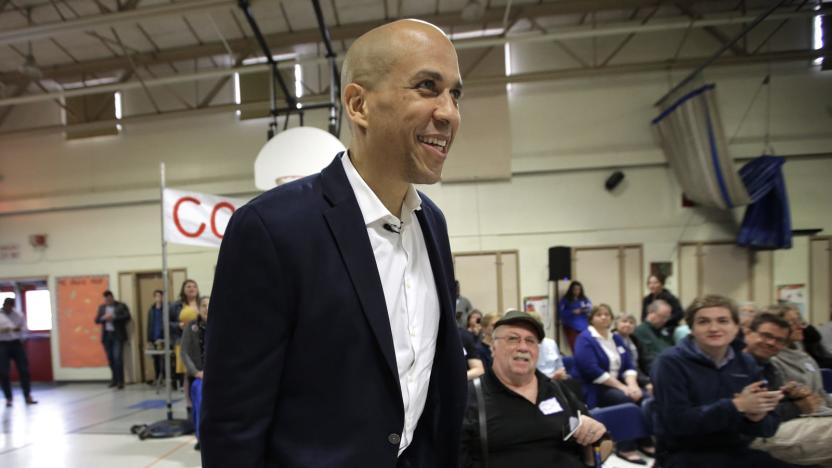
Senate bill would make tech companies test algorithms for bias
It's well established that algorithms can exhibit bias, however inadvertently, and a trio of US politicians believe they can do something about it. Senators Cory Booker, Yvette Clarke and Ron Wyden have introduced an Algorithmic Accountability Act that would require larger companies to test their algorithms and fix anything "inaccurate, unfair, biased or discriminatory." The move would also ask them to study how their systems protect personal data,and would let the FTC create regulations mandating impact studies for "highly sensitive" automated systems.

House of Representatives passes bill to restore net neutrality
The House of Representatives has passed a bill which would restore net neutrality rules the Federal Communications Commission repealed in 2017. Representatives approved the bill by 232-190 (with a sole Republican voting in favor), but the legislation still seems doomed.

Senate bill would ban deceptive data collection by internet giants
If American legislators have their way, tech companies will have to face more than negative publicity if they collect your data in a less-than-sincere fashion. Senators Mark Warner and Deb Fischer have introduced a bill, the DETOUR Act (Deceptive Experiences To Online Users Reduction), that would bar internet firms with over 100 million monthly active users from tricking you into handing over personal data. Companies wouldn't be allowed to develop interfaces with the "substantial effect" of preventing you from making an informed decision. They also wouldn't be allowed to divide users into groups for experiments without consent, and couldn't develop compulsive experiences targeted at kids under 13 years old (such as auto-playing videos).
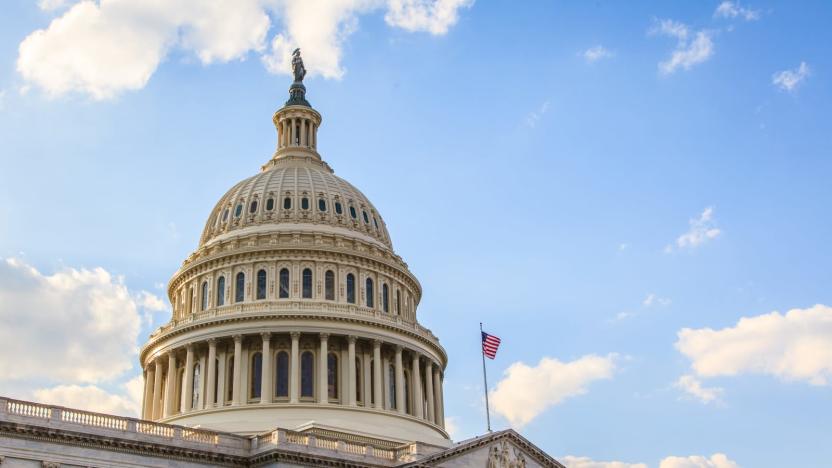
Former Senate IT worker pleads guilty to doxxing senators on Wikipedia
One former Senate worker is about to face harsh consequences for a doxxing campaign. Jackson Cosko has pleaded guilty to stealing multiple Senators' personal information from the Senate's network and publishing it on Wikipedia, including Mitch McConnell, Lindsey Graham, Orrin Hatch and Mike Lee. He admitted to being angry after he was fired from his systems administrator job at Sen. Maggie Hassan's office in May 2018, and conducted an "extensive computer fraud and data theft scheme" as revenge between July and October.

Senators want Congressional hacks to be public knowledge
When a company is hacked, consumers usually find out about it through the press or emails. You probably remember the Target hack that spilled data from millions of credit and debit card accounts. But do you remember the last publicly disclosed Congressional computer breach? (It was in 2009.) That's because Congress doesn't have to report when representatives' networks are hacked. Two Senators want to change that.

Senate bill proposes stricter privacy controls for children
Some politicians don't believe the Children's Online Privacy Protection Act does enough to protect kids in the modern era, and they're hoping to update it accordingly. Senators Ed Markey and Josh Hawley have introduced a bill that would amend COPPA with stricter controls on kids' data. It would ban ads targeted at kids, and would require an "Eraser Button" that would let kids and parents wipe data. The measure would still ban the collection of personal data for kids under 13 without their parents' consent, but it would also ban collecting data from the 13- to 15-year-old crowd without the user's permission.

Democrats introduce bill to restore net neutrality
Democrats have revealed a bill that aims to restore net neutrality rules. Speaker Nancy Pelosi and Senate Minority Leader Chuck Schumer were among the senators and congresspeople who announced the Save the Internet Act Wednesday. It's being introduced in both the House and the Senate and aims to codify the previous protections in law. Schumer called it a "real bipartisan effort," and hearings on the legislation are set to begin next week.

US bills would ban exports to Chinese telecoms that violate sanctions
American politicians want to crack down further on Chinese telecoms like Huawei and ZTE. Members of both the House of Representatives and the Senate have introduced bills that would order the President to impose export bans on Chinese telecoms found to violate US export and sanctions laws. Companies like Huawei and ZTE are a "growing threat to American national security," according to co-sponsor Rep. Mike Gallagher, and they should face the same punishment that ZTE faced before its reprieves.

Facebook suspends accounts for pushing false info in Alabama election
Facebook's attempt to thwart disinformation campaigns has typically focused on Russia and other hostile countries, but it's now grappling with that problem on its home soil. The site has confirmed to the Washington Post that it suspended five accounts for "coordinated inauthentic behavior" during the 2017 Alabama special election for the Senate, including the CEO of social media research company New Knowledge.
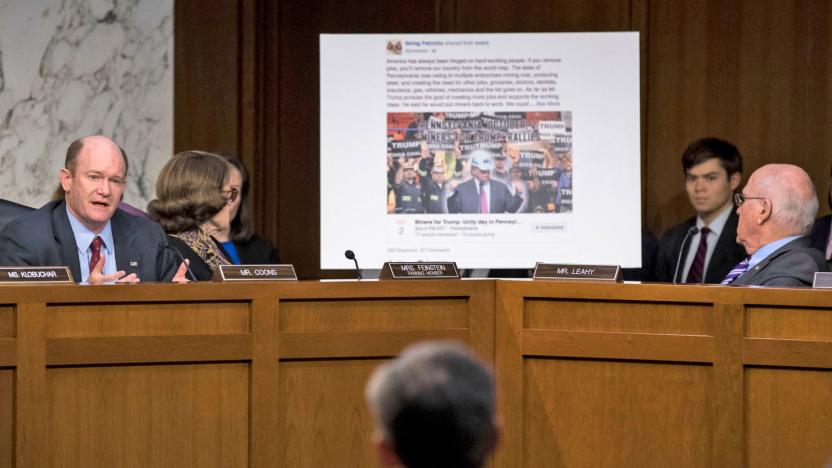
Senate report details Russia's online meddling in 2016 election
The US Senate is about to receive a report detailing Russia's online manipulation attempts during and after the 2016 Presidential election, and it promises to shed new light on the subject... including a lack of evidence from the internet giants themselves. The research, conducted by both Oxford University and network analysis company Graphika, outlines some familiar strategies. The Russians "clearly sought to benefit" the Republicans, rallying support for Trump on social networks while trying to "confuse, distract and ultimately discourage" Trump's opponents. It also notes that Russia's digital influence plans started with Twitter, but quickly expanded to Instagram and YouTube -- Facebook actually came last. They also tried smaller social networks like Google+, Pinterest and Tumblr (owned by Engadget parent company Verizon) as well as email.

After Math: Where are the adults
It's been quite the week of tantrums by the man-babies who run some of the largest companies in the tech industry. While Elon Musk cried and stamped his feet through what should have been a softball 60 Minutes interview, Twitter head Jack Dorsey spent much of his week encouraging everybody to visit sunny, genocidal Myanmar. And let's not even get started on what have become Mark Zuckerberg's weekly Facebook fiascos. Still, it's nice to see that at least some online institutions still have grownups behind the wheel.

Senate Democrats introduce bill to protect your online data
A group of 15 Democratic senators have unveiled a bill that aims to protect your online data. They noted that banks, doctors and lawyers are all required to protect your personal information, and argue websites, apps and other online services should also have to "take responsible steps to safeguard personal information and stop the misuse of users' data."
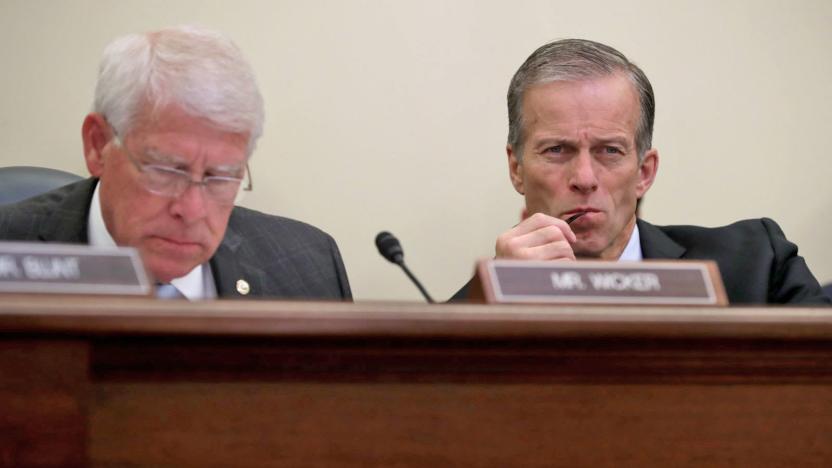
Senate bill takes aim at illegal robocalls
Three senators have proposed new legislation aimed at deterring robocall scams. The Telephone Robocall Abuse Criminal Enforcement and Deterrence Act, or TRACED, Act would give the FCC broader authority to penalize those that violate telemarketing restrictions, give the commission a longer window in which to act and establish an interagency working group that would explore additional actions that might deter robocall scams going forward. "As the scourge of spoofed calls and robocalls reaches epidemic levels, the bipartisan TRACED Act will provide every person with a phone much needed relief," Senator Ed Markey (D-MA), a cosponsor of the proposed legislation, said in a statement. "It's a simple formula: call authentication, blocking and enforcement, and this bill achieves all three."

The Senate is considering extending EV tax credits
As US senate majority leader Mitch McConnell debates making cuts to social security and medicare, Senator Dean Heller (R) of Nevada is hoping to keep electric car sales zipping forward with a new bill that would extend tax credits until 2022.





